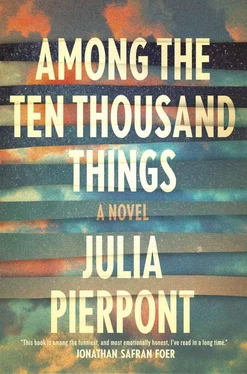“We’re doing ‘Diamonds,’ ” Izzy said, perched on a chair tipsy with dirty clothes. “Poor Ash had to do it with Naomi all week because of this damn leg.”
“I haven’t seen Naomi. She’s a little stiff, isn’t she?”
“Stiff? She’s a hulk. I have muscles too, but they don’t show. ”
Deb leaned against the white block wall and watched them together in the lighted mirror. “They show a little.”
“I know, I know. I can’t keep it on. Anyway, Saturday’s the gala. I just want to stay home with the dogs.”
“Parties are nice, though.”
“It’s so boring and everyone’s so old. I’ll probably just start screaming.” She sighed and began pinning back her hair. “ And it’s standing around all night that I really feel the tendonitis.”
Sixteen years ago, Deb had gone back to Saratoga to finish out the summer season and found herself at last set apart from the others, as the one who would soon be two. She’d never been a leader, but for those few weeks she almost led, by natural happiness, by what people called that glow. Quitting the company gave it back to her, the love she’d felt and the fun of it. She stopped worrying about steps and became part of the whole. The music was new again. And Lincoln Center, when she got back, became new. Chagall and his angels floating in red skies. The cratered limestone of the buildings that seemed to her made of moon.
“Oh my God, and how are the babies?” Izzy asked, rubbing a wet wipe in small circles over her skin.
“Huge. Adults. I wish they were babies.”
“Horrifying.” She leaned close to the mirror, peered into invisible pores. “That you gave birth to something that’s going through puberty. ”
Izzy was a personality, and Isabel Davey an altogether different one. The ditz and the diva — together they owned rooms. Deb had always been told that onstage she didn’t have any presence, flash. Not an actress. Pretty face but shy, and serious. She couldn’t help it — she was thinking. There was a brazenness she was missing, whatever mysterious quality allowed Izzy to play make-believe in front of thousands night after night. Every year that Deb was passed over, people told her not to feel bad, that these things were so often political. But she knew she’d never get the politics to work in her favor. She wasn’t one of those girls, didn’t really have wiles.
“Jack’s opening was last night.” On edge just broaching the subject, knowing where it might go, feeling she’d confess everything.
“Oh poo! I’m sorry I missed it. If I’d known I was going to be here…”
“Really, it’s not — honestly things are a little up in the air right now, with Jack.”
“Well, I’m sure it isn’t dull. God, I miss that big, bohemian husband of yours. So smart you were, marrying someone just completely not from this world. You know, this is it for me. I’m not doing my legacy or whatsit any favors dragging it on. That’s what Ash says, and he’s right. Of course he’s staying, if you think I like the idea of him here all hours with Marina Slutsanova.”
“What will you do?”
“Get fat! Pump out a few kids maybe.” That was just how she said it, and Deb felt doors close inside herself. “And this book that already I regret.”
“What book?”
“Oh come on, I told you about it.” She was picking at a spot on her cheek where there was no spot, only cheek. “It’s my, not a biography, like a nonfiction — like memoirs. I’m writing it myself, and this woman from the publisher is helping me. Ash wants to do Firebird in the spring, to time it to the release.”
“Iz, that’s amazing. A book.”
“Mmm.” A hairpin in the corner of her mouth.
Deb looked away from her, looked at herself. “Do you want kids?”
“Oh, who knows? If I even can,” she said, her hands in her hair. “I’m just talking, don’t listen.”
That afternoon Deb dialed Jack’s cellphone, which rang unheard in the empty studio where he’d left it. Jack had spent the day working distractedly and didn’t realize he’d forgotten his phone until he was off the subway. Climbing the steps he had a few minutes to spare but couldn’t know it, and he set off in broad strides toward the planetarium, that giant, off-white aluminum sphere that seemed to levitate within a larger glass cube. The whole building had been redone about ten years earlier, paid for and named after a family that owned half of New York, his mother-in-law’s apartment complex included, and had done similar work for the public library and Lincoln Center. The building it replaced had been brown brick and had looked a bit like a high school; Jack had wanted not to like the new one, but he did. The right thing for a planetarium. Like the Death Star embalmed.
In the lobby area where school groups were meant to collect, Jack waited amid the rainbow minefield of backpacks. The bags were cartoon huge, packed to capacity even on a day when the kids didn’t need their books. They came in highlighter colors with reflectors on their outer pouches for crossing the street at night. Some were embroidered with initials: JSR, ASB, even SAD.
A clot of girls stood a few yards away, playing some type of game where it was his daughter’s turn. She was spinning around and around as a blonde with thin arms trailed behind her, hands clamped over Kay’s eyes. His daughter’s legs tripped right over left, and Jack realized the blonde was actually leading, dragging Kay, whose pleated skirt twirled too high and whose body looked reluctant to follow her head. Some sort of dizzying game, though he thought she was laughing. Laughing and crying can look about the same.
Jack started to dig around for his daughter’s backpack, which he did not think bore her initials but which he knew was pink. Pink or else red. When he found it, he hooked his fingers through the loop up top and looked to where the girls were still playing.
“Babe, let’s go,” he heard from one of the mothers, a woman in a long, black coat — though it was practically summer — whose approach to parenting seemed more assured than his own. She called again, “Babe,” and the tiny blonde who’d been fastened to Kay let go and galloped over.
“Move. We’ve got karate and your brother.”
The girl swung her head so her hair fanned out around her. She pointed at Jack. “He has my bag.”
The black coat descended on him, and then Kay was there too, but blondie hung back, like a shy person, though Jack didn’t believe she was shy.
“I’m sorry. I thought it was hers,” he said, pointing at his daughter. It came out strange, hers, like he didn’t know her name.
The blonde’s mother took the bag by one strap and slung it over her shoulder, where it hung incongruous with the coat. “How’s Deborah?” she asked, to show him that they knew each other.
“Great. Very good. And you?”
The mother nodded. “Well, we’ve loved having Kay over. We’ve loved having all the girls.” By which she meant, I have fed your daughter pizza and frozen waffles and rented her movies and put her in a warm bed or sleeping bag at night, and you do not know my daughter’s name. By which she also meant, We equals myself and my husband together, we who are happy, and all the girls equals we have a house with many rooms and are popular at PTA meetings.
“Thank you, yeah,” Jack said. “They’re good kids,” though they could have been monsters, how could he really know?
“Which friend was that again?” he asked when the black coat and blondie had left.
“Racky.”
“And the mother?”
“Arlene. Mom doesn’t like her.” Kay found her own bag. It was purple. A purple monkey dangled from the zipper.
Читать дальше












